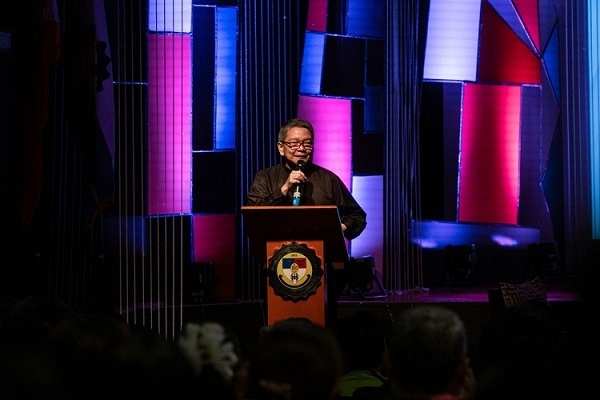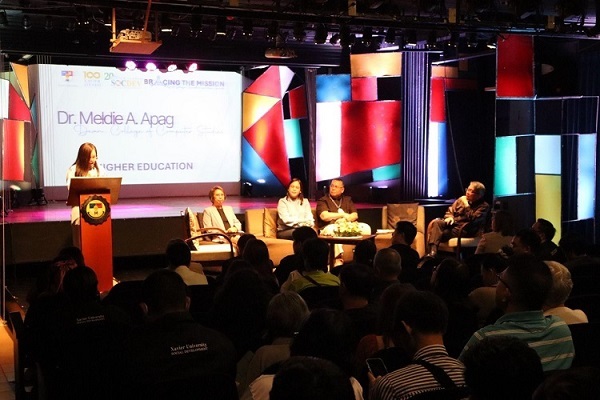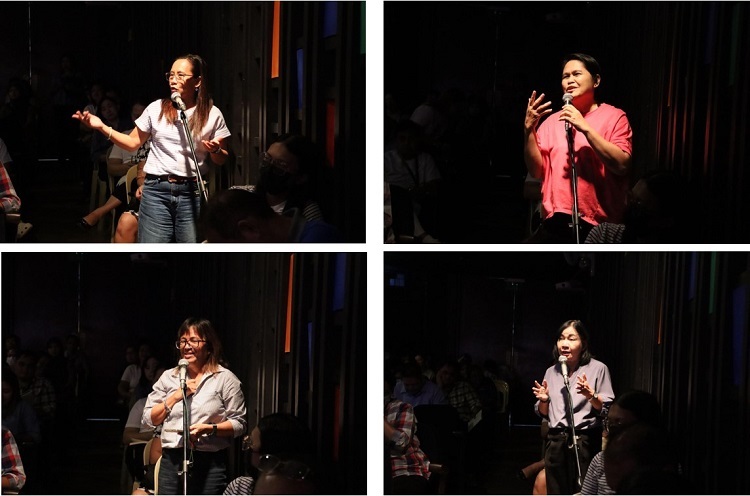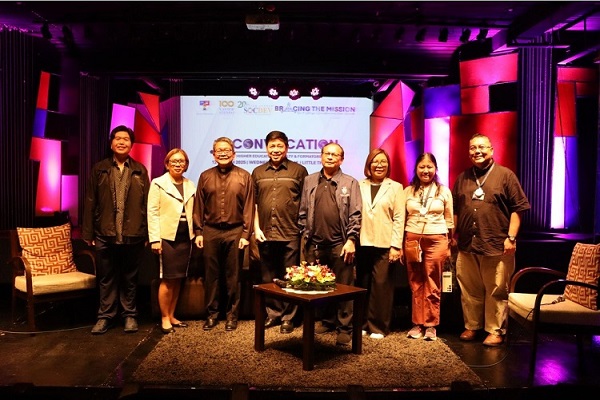By Siegred Jade L Paigalan

In Photo: Fr Jose Ramon “Jett” T Villarin is all smiles as he delivers his keynote message
during the Higher Education Convocation
Xavier Ateneo’s Higher Education and Social Development Clusters collaborate in the Higher Education Convocation of Faculty and Formators during the Social Development Week. This collaboration coincided with the Social Development Cluster's 20th anniversary, marking its official organization in 2005 under the guidance of then University President, Fr Jose Ramon “Jett” T Villarin, SJ, who also delivered the Convocation's keynote address.
Fr Mars P Tan, opened the convocation, commemorating the 20th anniversary of the Social Development Cluster's official organization. He emphasized the significant growth and expansion of social development initiatives at Xavier Ateneo over these two decades. Fr Mars also shared a personal anecdote, recalling Fr Jett, not only as the university president who welcomed him as a faculty-researcher but also as his former mathematics professor at Ateneo de Davao University, where Fr Jett briefly served as a young Jesuit volunteer. In his opening remarks, Fr Mars encouraged the Xavier Ateneo community to engage in collective reflection through the convocation, saying, “Let us use this opportunity as a University community to reflect on the theme and discuss our various roles in embracing the mission, thereby establishing stronger connections and collaborations.”
Vice President for Social Development, Engr Dexter S Lo, shared the origins of Xavier Ateneo's social development initiatives, recalling the time he worked with what he called, 'Xavier Ateneo's Living Legends.' He explained how they exchanged ideas in identifying solutions that will address the city's critical issues. He reiterated that Xavier Ateneo's mission continues to be 'solutions-driven, problem-focused, and data-driven, with a preferential option for the poor.' Engr Lo also launched the anniversary video celebrating ‘Xavier Ateneo's 20 Years of Social Development Mission’ and formally introduced Fr Jett as the convocation’s keynote speaker.
Fr Jett opened his keynote message with a brief recollection of his years in Xavier Ateneo as University President, he shared, “this place has been a place of happy memories, joyful memories, also, painful memories. But as we all know the joy is always greater than the pain, the love is always greater than the pain”. As he proceeded with his input, Fr Jett spoke passionately about the concept of making the invisible visible, “see the invisible, or make the invisible, visible”, as he would put it, drawing parallels between the Cagayan de Oro River’s origins and social development. Reflecting on his early experiences with the river, he posed the question, "Can anyone really tell where a river begins?" He likened this to the unseen yet interconnected factors that shape social change.
To make more emphasis on his first point, Fr Jett recalled a strategic planning session near Isla de Oro, where he noted the looming disaster that would later manifest during Typhoon Sendong in 2011. He shared a haunting image of a child searching for a baby sibling in the floodwaters, stressing the urgency of proactive intervention. "We have to do more for our children," he urged. "Providing intellectual resources and forming values is not enough. We must act." He emphasized that the university must extend beyond intellectual discourse and take concrete actions to address social issues. Using the analogy of a wounded pinky finger affecting the whole hand, he underscored the neglect of the poor and the environment, both of which are often overlooked. "The poor and the environment are invisible—easily disregarded," he remarked.
For his second point, Fr Jett highlighted the necessity of utilizing science to illuminate systemic issues. However, he warned against cyclical, ineffective solutions that resemble a carousel. "Like a merry-go-round, we keep coming back to the same problems," he noted. "Why is there no real change?" He called for sustainable economic models that reduce waste and mitigate environmental harm. "Waste is invisible, yet it shapes our world," he cautioned. He also underscored the importance of communication and storytelling in making science accessible to society. "Science gets lost in translation," he observed. "It needs the humanities, the social sciences—the power of words and stories." Comparing this to Jesus' use of parables, he stressed that difficult truths are best understood through narratives. "We need to move together—start conversations and dialogues."
At the end of his message, Fr Jett shared a piece by Merlinda Bobis titled "Sampulong Guramoy" (Ten Fingers), which resonates with the themes discussed. The narrative highlights the strength and resilience of the community, emphasizing the collective effort needed to uplift and support one another. The phrase "Ten fingers, ten strong fingers, send you to school" serves as a powerful reminder of this collective responsibility.

In Photo: XU Community engaged in a conversation during the convocation, led by a panel of reactors.
Several speakers shared their impressions of Fr Jett’s inputs. Dr Meldie A Apag, Dean of the College of Computer Studies, emphasized higher education’s role as a catalyst for social change, while Dr Heide R. Rabanes, Dean for Research, advocated for research that influences societal structures. Fr Frank Dennis B Savadera SJ, Vice President for the Office of Mission and Ministry, highlighted that scientific engagement should be rooted in accountability and action. "We don’t engage in science for the sake of intellectual curiosity," he stated. "We engage in science to be accountable and to act."
Dr Pamela Q Pajente, Vice President for Basic Education, explored the role of education in fostering empathy and social responsibility among young minds. Dr Astrid L Sinco, Director of the McKeough Advancement for Environment, Resilience, and Sustainability (MAERS) Center, reiterated that the university is more than a repository of knowledge; it shapes leaders dedicated to service. "We are called to take what we learn and apply it to all walks of life," she noted.
During the forum led by Victoria Melissa C Pulido, Service-Learning Formator, the intersection of science, policy, and practice was discussed, highlighting the dangers of misinformation. Fr Jett also pointed out the challenge of managing political forces, which often hinder meaningful action. "You know what is good, yet you still do what is not good," he remarked, citing funding cuts to scientific research due to political conflicts. "Scientists are here, but politics gets in the way. Ignorance remains because it is convenient."

In Photo: (From L to R, and T to B) Dr Shiela Balbutin, Ms Gail dela Rita, Dr Anabel Abuzo, and
Dr Jane Gallamaso, each shared their reflections and insights from Fr Jett’s input
Dr Sheila C Balbutin, Director of the Office of International Cooperation and Networking, emphasized the importance of communication in connecting policy and practice, noting that its value often goes unnoticed. She advocated for a greater emphasis on effective communication in social change and policy implementation, highlighting its crucial role in these processes. Ms Gail P de la Rita, Director of the Service Learning Program, underscored the significance of SD in education, allowing students to engage with real-world challenges. Dr Carthelyn Adajar, SD Coordinator of Humanities, highlighted the need to recognize overlooked research elements, while Dr Mark L Labuntog, Learning Development Coordinator, questioned how science enables people to perceive the invisible. Fr Jett responded by likening it to gravity—an unseen force, yet deeply felt, much like faith and psychology. "Science is more than formulas," he explained. "It is about understanding the unseen forces that shape our lives."
Dr Anabel A Abuzo, Director of the Engineering Resource Center, shared her experiences in social development, confronting political obstacles while striving for change. "Sometimes, working for the common good feels disheartening," she admitted. "How do we keep going when politics obstructs our efforts?" Fr. Jett reassured her, emphasizing that while the common good may be theoretical and invisible, trust and purpose sustain perseverance. "Joy is greater than pain," he said. "Remember why you are doing this." Dr. Jane Gallamaso, a faculty from the Philosophy department, called for an integrated approach, asserting that science alone is insufficient without a moral foundation. "Without a moral foundation, science alone is not enough," she said.

In Photo: University Administrators pose for a photo with Fr Jett Villarin, SJ
The convocation concluded with Dr Juliet Q Dalagan, Vice President for Higher Education, who likened the mission of social development to a small yet essential part of a greater whole. "Keep that fire burning in our hearts," she encouraged. "Let it serve as a catalyst for change. Carry forward the spirit of service—because even the smallest finger plays a crucial role in the body’s strength."
The Higher Education Convocation is a bi-annual gathering of Xavier Ateneo Faculty and Formators. This semester’s convocation reinforced the university's commitment to bridging academia and social development, utilizing knowledge as a tool for societal transformation.